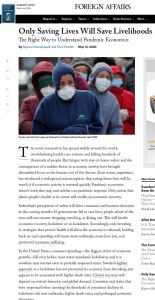Join getAbstract to access the summary!

Join getAbstract to access the summary!
Rajeev Cherukupalli and Tom Frieden
Only Saving Lives Will Save Livelihoods
The Right Way to Understand Pandemic Economics
Foreign Affairs, 2020
What's inside?
Better health will make for a better economy.
Recommendation
As the COVID-19 pandemic continues, many have gotten restless about the economy and seem willing to sacrifice public health efforts to get people back to work. In this compelling article, economist Rajeev Cherukupalli and former US Centers for Disease Control director Tom Frieden make a strong plea to resolve the health crisis first; they argue this will make economic recovery speedier and stronger.
Take-Aways
- Public safety is critical to economic recovery.
- Governments have to make major investments on several fronts.
- “What’s good for public health is also good for business.”
Summary
Public safety is critical to economic recovery.
The COVID-19 pandemic has forced lockdowns all over the world. But by mid-May 2020, concerns that the economy will crash as a result of quarantine measures have overtaken the focus on protecting people from infection, even though ignoring the health crisis will further delay economic recovery.
““In the United States, consumer spending – the biggest driver of economic growth – fell even before most states mandated lockdowns, and it is nowhere near normal, even in partially reopened states.””
Reduced consumption results from public fear and uncertainty. Individuals will hesitate to resume their normal lives if the death toll keeps increasing, regardless of official stay-at-home measures.
Governments have to make major investments on several fronts.
Lockdowns buy time for officials to develop effective strategies to both protect people’s health and allow them to engage in sustainable levels of economic activity. Crucial safety precautions include “widespread testing, isolation of those infected, contact tracing and quarantine of those contacts.” These practices are all expensive – requiring billions of dollars – and they demand time and preparation to implement. But they are necessary for resuscitating the economy. Even temporary solutions to separate the afflicted can help save lives, as seen in Germany and South Korea. Those countries invested in provisional sites to care for patients and thus minimized the impacts on their economies. Such actions further extend the time for scientists to develop a vaccine and make it available to the public, which is the most efficacious path to resuming social and economic life.
““Ultimately, nothing will allow people to get back to a pre-COVID-19 normal except a vaccine.””
At the same time, governments can help people directly. For those quarantined, unemployed or at high risk, or for those who cannot work remotely, states could expand paid sick leave, offer broader health and disability insurance, and enhance unemployment benefits and wage supplements. Also, officials can impose rules on businesses to protect those in essential jobs in sectors such as health care and food supply chains. Employers can support their workers by supplying protective gear and implementing appropriate hygiene practices.
“What’s good for public health is also good for business.”
Governments are more eager to spend during crises, as their actions are measurable. In the case of COVID-19, those outcomes are lives saved and economic recovery achieved. But as the crisis wanes, states may slip into a false sense of security and look to cut public health spending. Countries need to take pandemic risks seriously; people’s lives and jobs are in jeopardy. Only continued investment in public health can minimize the risks and consequences of the next pandemic. The costs amount to a “rounding error of its economic benefit – a matter of spending billions to save trillions.”
About the Authors
Rajeev Cherukupalli is an economist at the John Hopkins Bloomberg School of Public Health. Tom Frieden is a senior fellow at the Council on Foreign Relations and the president and CEO of Resolve to Save Lives.
This document is restricted to personal use only.


















Comment on this summary